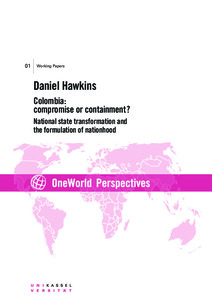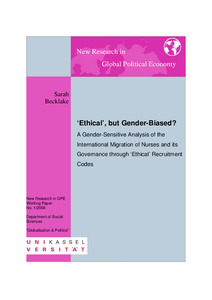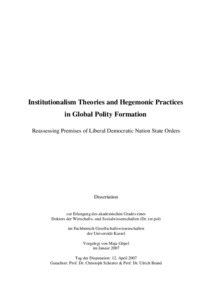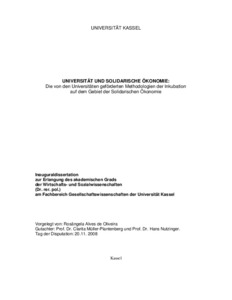Suche
Anzeige der Dokumente 1-4 von 4
Working paper
 Colombia: compromise or containment?
Colombia: compromise or containment?
(Universität Kassel, Fachbereich Gesellschaftswissenschaften, Fachgebiet Internationale und Intergesellschaftliche Beziehungen, 2008)
The design, reformulation, and final signing of Plan Colombia by the then US President, Bill Clinton, on the 13 July 2000 initiated in a new era of the US State´s involvement in supposedly sovereign-territorial issues of Colombian politics. The implementation of Plan Colombia there-on-after brought about a major realignment of political-military scales and terrains of conflict that have renewed discourses concerning the contemporary imperialist interests of key US-based but transnationally-projected social forces, ...
Working paper
 ‘Ethical’, but Gender-Biased?
‘Ethical’, but Gender-Biased?
(2008-11-17)
The migration of healthcare professionals from developing to developed countries, often aided by recruitment agencies, is a phenomenon of great international concern, as reflected in the construction of numerous ethical recruitment codes, which aim to govern the process. In an attempt to provide an overview of the situation, dealing specifically with the migration of nurses, as well as a critical and gender sensitive analysis of the codes, this paper follows three broad steps: first, it reviews the literature dedicated ...
Dissertation
 Institutionalism Theories and Hegemonic Practices in Global Polity Formation
Institutionalism Theories and Hegemonic Practices in Global Polity Formation
(2008-11-03)
Institutionalistische Theorien und hegemoniale Praktiken Globaler Politikgestaltung.
Eine neue Beleuchtung der Prämissen Liberaler Demokratischer National-Staatlicher Ordnungen. Deutsche Zusammenfassung:
Moderne Sozialwissenschaften, seien es Metatheorien der Internationalen Beziehungen, die Geschichte politischer Ökonomie oder Institutionentheorien, zeigen eine klare Dreiteilung von Weltanschauungen bzw. Paradigmen auf, die sich in allen „großen Debatten“ nachvollziehen lassen: Realismus, Liberalismus und ...
Dissertation
 Universität und solidarische Ökonomie
Universität und solidarische Ökonomie
(2008-11-24)
RESUMO: A economia solidária é aqui apresentada como um movimento social emancipatório e como uma das formas de resistências das trabalhadoras e trabalhadores ao modelo de desenvolvimento capitalista. O movimento contemporâneo de economia solidária abrange o processo de produção, comercialização e finanças. A economia solidária é caracterizada pela posse coletiva dos meios de produção e pelo controle dos trabalhadores dos empreendimentos através de autogestão, cooperação e solidariedade. Os empreendimentos econômicos ...




